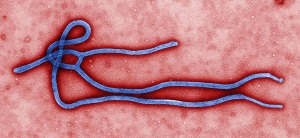 |
| Ebolavirus under an electron microscope--Courtesy of CDC |
A Sarepta ($SRPT) antisense drug that targets a single ebolavirus protein successfully protected 75% of the rhesus monkeys it was given to, offering some solid animal data to back up the biotech's claim that it has an effective antidote to the lethal disease.
The U.S. Army Medical Research Institute of Infectious Diseases, USAMRIID, collaborated with Sarepta on the small animal study, which tried out several new drugs. Sarepta's AVI-7537, which targets the VP24 virus protein, proved the most effective of the bunch. Researchers also tried out AVI-7539 as well as a combo of the two dubbed AVI-6002. 7539 proved ineffective while the combo protected 62% of the rhesus monkeys in that arm of the study.
The results bear out Sarepta's stance that its therapies could prove a big help in guarding people from Ebola, which attracted global headlines after an outbreak in West Africa killed thousands of people and spread in a few isolated cases to Western countries. Now the outbreak appears to be winding down, along with much of the press coverage that once attended every twist and turn in the development of new vaccines and therapies.
"Antisense drugs are designed to enter cells and eliminate viruses by preventing their replication," USAMRIID's Travis Warren said in a statement. He went on to explains that the drugs block the production of the targeted protein, preventing viral replication and giving an individual's immune system a chance to respond. Ebola is known for its sudden overwhelming attack on people which is too strong for the immune system to guard against.
Reuters notes in its coverage that Sarepta is not alone in this field, or necessarily the best at what it does. Mapp Biopharmaceutical's ZMapp has proven to be effective in protecting all the primates in its study while Tekmira has also touted results from an animal study.
- here's the release
- here's the report from Reuters